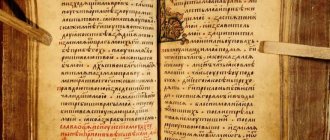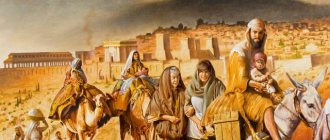Text of Psalm 102
The Church Slavonic version of the prayer is considered canonical, which is why it is performed in churches during services. For personal appeal to God, this text is used by those who seek to achieve maximum proximity to Him.
Not all lay people are trained in Church Slavonic. Those who do not have special training are recommended to read Psalm 102 in Russian. In this form, its content is easier to perceive, which means the meaning of the work becomes more understandable.
With accents in Church Slavonic
In Russian
Why is Psalm 89 read?
Psalm 89 is read at funerals. A person has a body that cannot live a long life, because it is fleeting and you never know what the end will be. In villages near churches, a prayer is recited when wishing for rain during the dry season.
You can read the prayer at home. The Russian version is suitable for this. Kneel in front of the icon, light the candles, clear your mind. Worldly experiences should not disturb your heart; be calm during dialogue with Him.
If your request is pure and your thoughts are noble, the Lord will listen to you and grant you what you want.
History of writing
A number of psalms included in the collection called “The Psalter” were written by the same person. Some songs of praise are even considered paired, since their content not only reveals the same topic, they literally complement each other and echo each other in meaning. These include Psalms 102 and 103. The first in the vast majority of Bibles (in different translation versions) contains an indication that its author is the prophet David.
This prayer was carefully studied by historians and theologians, but they were never able to establish at what period of his life the king composed it. It is possible that he wrote this song, like a number of others, after the blessing of the Lord, in a moment of calm, of which there was little in his life. Some experts suggest that Psalm 102 was created by David early in his reign.
Kathisma 14 Psalm 102
Psalm 102
Psalm of David
These psalms, as well as 18 and 19, 69 and 70, etc., are called paired, since when they belong to the same writer, they differ in the same content, mutually complementing each other.
Psalm 102 belongs to David, as can be seen from the inscriptions of the Hebrew, Greek and Latin Bibles and speaks of God’s Providence in human life and the moral world, while Psalm 103 speaks of providence in the physical world. Therefore, both psalms, distinguished by the unity of content and method of presentation of thoughts, belong to the same writer David, although his name is not placed above the 103rd psalm in the Hebrew Bible, but is in the Vulgate and LXX.
It is impossible to indicate with precision when these psalms were written. It must be assumed that in a calmer, more peaceful time of his reign, when David could surrender to the contemplation of human life and the life of nature, which could have happened in the last years of his life and reign.
Bless, my soul, the Lord, who cleanses your spiritual ailments and showers you with external blessings (1-5). The Lord is merciful: He protects the offended, does not become angry to the end, and does not reward us with all the severity we deserve (6-10). His mercy towards us is immeasurable: He, like a father, condescends to us, weak and powerless (11-16). His mercies are everlasting towards those who fear Him (17-18). May all the Angels and all creatures in all places on earth bless Him, the King of the whole world (19-22).
1 Bless the Lord, O my soul, and bless all that is within me, His holy name. 2 Bless the Lord, my soul, and do not forget all His benefits. 3 He forgives all your iniquities, He heals all your diseases; 4 He delivers your life from the grave, crowns you with mercy and bounty; 5 satisfies your desire with good things: your youth is renewed like the eagle.
1-5. David motivates himself to praise the Lord worthy. “My insides” is my whole being. God's benefits to man are great and varied: He cleanses man's iniquities (sins), heals him from spiritual illnesses ("illnesses"), thereby saving him from temporary and eternal death ("from the grave"), rewards man with spiritual and material benefits, every good thing He fulfills the desire and, like the eagle, which, according to ancient views, was completely renewed and became young every 10 years, preserves and maintains spiritual vigor and physical strength in a person. Probably, in the last expression, David had in mind examples of the longevity of the patriarchs, who were distinguished by their vigor, spiritual and physical strength until old age.
6 The Lord brings righteousness and judgment to all who are wronged. 7 He showed His ways to Moses, and to the children of Israel His works.
6-7. The Lord pours out His blessings on all people; He gives protection to all those offended (“truth and judgment”). The law He gave through Moses, where He indicated how a Jew should live and with what to harmonize his will (“paths”), as well as the miracles performed then, are an expression of God’s love and care for man. With this law He protected the weak from the arbitrariness and limitless arbitrariness of the strong, and with His miraculous help He supported and nourished affection for Himself.
8 The Lord is generous and gracious, slow to anger and abounding in mercy: 9 He is not angry to the end, nor is he always angry. 10 He did not deal with us according to our iniquities, nor did He reward us according to our sins: 11 For as the heavens are high above the earth, so great is the mercy [of the Lord] toward those who fear Him; 12 As far as the east is from the west, so has He removed our iniquities from us; 13 As a father shows mercy to his sons, so the Lord shows mercy to those who fear Him.
8-13. The Lord is generous, long-suffering and abundantly merciful. His anger is never eternal in relation to a guilty person; on the contrary, the punishments He sends are always weaker than the offense that caused them. How great is the distance between heaven and earth, so abundant are the benefits of God upon those who revere Him, and how far is the East from the West, so far from God is the punishment of man for each of his sins, or - so deeply forgives, God does not impute to man many of his shortcomings. Therefore, the relationship of God to man can be called the relationship of a father to his children.
14 For He knows our composition; He remembers that we are dust. 15 The days of a man are like grass; like the flower of the field, so it blooms. 16 The wind passes over him, and he is no more, and his place knows him no more. 17 Now the mercy of the Lord is from everlasting to everlasting to those who fear Him, 18 And His righteousness is upon the sons of sons, who keep His covenant and remember His commandments to do them. 19 The Lord has established His throne in the heavens, and His kingdom rules over all.
14-19. Man is weak and helpless by his very nature: he can be compared to a one-day-old flower, which dries up by evening. A small breath, a wind (“the wind will pass”) - and he dies. Man would quickly perish if he were not supported by God, whose mercy towards man is eternal and unchanging. Help from Him is an indestructible support, since He is the King of the whole world - the King both over heaven and over everything that exists on earth.
20 Bless the Lord, [all] His angels, mighty in strength, who do His word, obeying the voice of His word; 21 Bless the Lord, all his armies, all his servants, who do his will; 22 Bless the Lord, all His works, in all the places of His dominion. Bless the Lord, my soul!
20-22. Such a king should also be glorified by the angels, who are “mightier in strength” than man in hearing and doing His will; they know God better than man, since through them, as His closest servants, He manifests His power in the world. “Mighty in strength,” “His armies,” “His servants” are the Angels of God. It may be that their different names indicate different degrees and types of their service, their division into several ranks, the idea of which was not alien to the beliefs of the Jews. This king should be praised by the whole world, all creation.
The depiction of God’s merciful attitude towards man is distinguished here by its extraordinary touchingness.
When and how to read Psalm 102?
In church, Psalm 102 is read during the evening service on Saturday or Sunday morning. It is pronounced privately in Russian, and it is important to tune yourself to the appropriate wave, the wave of “jubilation.”
A song of praise serves as an expression of gratitude to God. It can be combined with the morning and evening prayer rules.
Saving prayer becomes in such cases:
- exacerbation of the disease;
- the desire to conceive, safely bear and give birth to a child;
- for gynecological problems.
You can also use Psalm 102 to thank the One Creator for His mercy and support.
Interpretation
Each verse of the song contains exclamations of praise, but they are still interpreted differently:
Verses 1 to 5. Praise of the works of the Lord, their writing. Here, with every word, the author tries to glorify the Almighty and what he gives to humanity:
- healthy children;
- healing from physical and mental illnesses;
- various material benefits;
- forgiveness of sins, vitality.
Verses 6 to 7. The emphasis is on the law of God as delivered to the Jewish people to all who believed in Him. This law teaches care and love, righteous life.
Verses 8 to 13. The Lord is terrible when he is angry, but he cannot remain angry for long. He punishes and forgives those who humbly accept punishment and repent of their sins. To describe the mercy of the Almighty, its depth and infinity, the author uses various metaphors and comparisons.
Verses 14 to 19. People are like flowers, today they bloom, and tomorrow they fade. God alone is eternal and His greatness before people.
Verses 20 to 22. Praise to the almighty Lord.
Psalm 102. Psalm 102. Text in Russian
102.1. Bless the Lord, my soul, and bless my whole being, His holy name.
102.2. Bless the Lord, my soul, and do not forget all His benefits.
102.3. He forgives all your iniquities, He heals all your illnesses;
102.4. delivers your life from the grave, crowns you with mercy and bounties;
102.5. satisfies your desire with good things: your youth is renewed like an eagle.
102.6. The Lord brings righteousness and judgment to all who are offended.
102.7. He showed His ways to Moses, and to the children of Israel His works.
102.8. The Lord is generous and merciful, long-suffering and abounding in mercy:
102.9. He is not completely angry, and is not forever indignant.
102.10. He did not deal with us according to our iniquities, nor did He reward us according to our sins:
102.11. for as the heavens are high above the earth, so great is the mercy [of the Lord] toward those who fear Him;
102.12. As far as the east is from the west, so He has removed our iniquities from us;
102.13. As a father has mercy on his sons, so the Lord has mercy on those who fear Him.
102.14. For He knows our composition, He remembers that we are dust.
102.15. Man's days are like grass; like the flower of the field, so it blooms.
102.16. The wind passes over him, and he is no more, and his place no longer recognizes him.
102.17. But the mercy of the Lord is from everlasting to everlasting to those who fear Him,
102.18. and His righteousness is upon the sons of sons, who keep His covenant and remember His commandments to do them.
102.19. The Lord has set His throne in heaven, and His kingdom rules over all.
102.20. Bless the Lord, O His angels, mighty in power, who do His word, obeying the voice of His word;
102.21. Bless the Lord, all His armies, His servants, who do His will;
102.22. Bless the Lord, all His works, in all the places of His dominion. Bless the Lord, my soul!
ᐅ Navigation through the Psalms:
, , , , , , , , , , , , , , , , , , , , , , , , , , , , , , , , , , , , , , , , , , , , , , , , , , , , , , , , , , , , , , , , , , , , , , , , , , , , , , , , , , , , , , , , , , , , , , , , , , , 100, 101, 102, 103, 104, 105, 106, 107, 108, 109, 110, 111, 112, 113, 114, 115, 116, 117, 118, 119, 120, 121, 122, 123, 124, 125, 126, 127, 128, 129, 130, 131, 132, 133, 134, 135, 136, 137, 138, 139, 140, 141, 142, 143, 144, 145.




